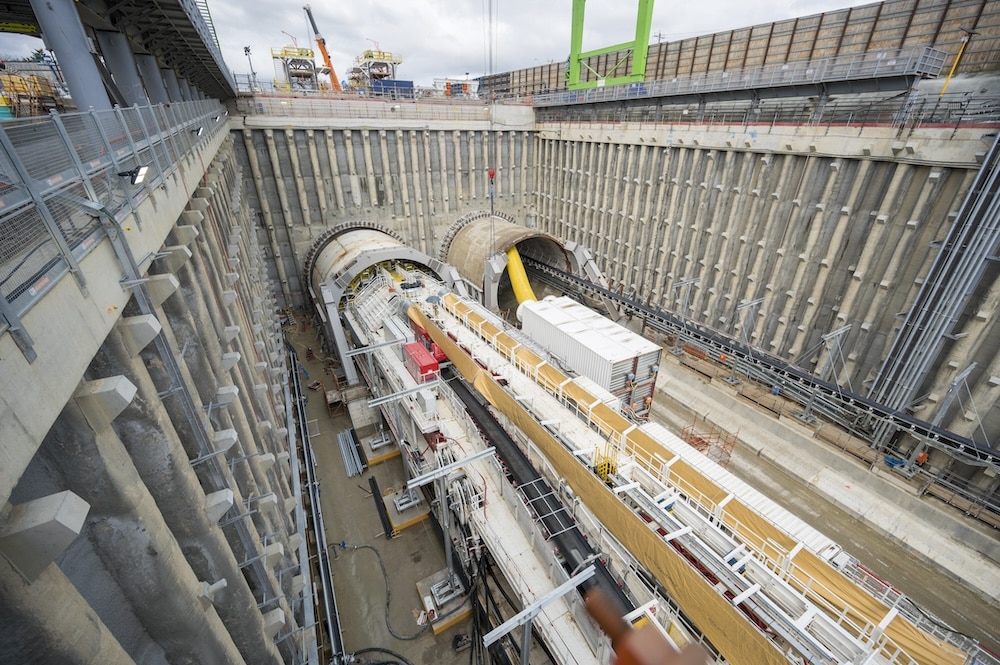
Since founding IOS 22 years ago at Chicoutimi in Québec, Réjean Girard has seen no fewer than four recessions and it's an achievement in itself that, as a service provider to the notoriously cyclic mining industry, the firm has managed to grow through each of them. It has forged a reputation well beyond Québec and Canada as an efficient and innovative operator.
Canada has a reputation for leadership in mining investment, as evidenced by the success of the TSX in listing companies. However the mining industry is very conservative, and nowhere more so than in Canada itself. Girard notes, and regrets, the fact that investment in technology has been allowed to lag behind field operations. “Exploration is risky and expensive, and to give it a better chance of success we need to constantly renew our toolbox,” he says. “But minimal incentives are made available for doing that.”
Drilling cost are humongous – up to 60 percent of all investments – and improved targeting approaches are a must. We have too much tolerance of poor planning, he believes. Marginal projects shall be abandoned earlier, saving large sums for viable ventures. “Overall exploration costs are too high compared to the revenue of the industry. It is a structural problem.” This he thinks is due to investors' tendency to consider exploration as a goal, not as a means. “This is an industry driven either by greed or passion – two behaviours that are very difficult to manage!” Whatever the cause, there's no arguing with the fact of boom and bust and their consequent cost to the industry.
There's equally no arguing with the fundamental demographics. To fully industrialise the BRIC nations will take more mineral resources than mankind has already produced. With 30 million people in China moving every year off the land and into the cities, that country alone will need to build the equivalent of Canada's infrastructure every year! They and the mining industry are being done no favours – investors need to take a longer view and the industry needs to iron out its peaks and troughs.
It could do worse than look at the example of IOS. Plan for the boom when you are in the doldrums, and for the bust when things are good. And be ready; the boom is coming! In a downturn, budgets are slashed, research gets hit and innovation dries up, but that is just the time when the seed corn should take priority because the current trough has to end soon – he thinks the upturn will be established by the end of this year.
The mines will not be ready though – during 2012, some $800 million was invested in exploration in Québec alone, in 2013 less than a twelfth of that. Is this any way to run a business as essential as mining, he asks. No wonder so many companies go to the wall – but not IOS! “It needs a lot of experience to level the field. In the good times we act like squirrels hiding nuts everywhere! Then when the lean times come, we have resources to back our human resources onto scientific research and development processes. That allows them to carry on working when there are no clients, and the company to conceive and develop new product to be ready when the next boom comes.”
Something rather remarkable came out of the latest recession – something that looks like an engineering project, despite the fact that IOS is not an engineering firm. Mining in Canada (and right around the tundra belt) is made difficult, slow and expensive by the terrain and the climate. Canadian swamps are endless! The favoured way to get about is by helicopter, which doubles the exploration costs. So IOS got together with its neighbour L’Équipe Fabconcept to develop an all-terrain vehicle (ATV) capable to partly replace helicopters and drastically reduce operating costs. The prototype and the first production Kaskoo-X04 were successfully tested over a variety of unimaginable terrains. Girard believes this vehicle will be outperforming during the harsh Canadian winter, when access roads are closed and the lakes frozen. “This incredible ATV has definitely proved that it can deliver the job.”
The Kaskoo-X04's innovative technology makes it the best all-terrain vehicle on the market today, according to the manufacturer. It's quite fast, reaching up to 40 kph due to its superior suspension and a comfortable passenger compartment. It floats despite its 1.5 tons cargo; it crawls effortlessly in deep mud and snow – Canada's lakes and swamps are no obstacle. Fabconcept needed IOS to test the machine and make sure it fits the market requirements. Everyone in Canada knows IOS and that its evaluation of the savings over helicopter usage can be depended on. L'Équipe Fabconcept is now tooling up to start production – in small numbers at first but ready to meet demand from Canada and beyond. It's simple, cost reduction relies upon innovation.
The next big thing from IOS neatly complements the Kaskoo-X04. Another huge cost up-country is heating the camps. Heating fuel easily costs $1,200 a drum in the Canadian north, as it needs to be brought in by seaplane or helicopter. IOS developed a geothermal system for the camps that works on the heat differential between the lakes and the atmosphere. “We can get a camp running with a single generator burning one drum of fuel a day instead of 20 or so a week.” The system is modular, can be installed in two days, and provides air conditioning in the summer and heating in the Canadian winter. “That is the kind of technology that keeps us ahead of the competition. If you do not have it, you are left to compete on price alone!”
Remember the analogy of the squirrels? Being canny with its 'nuts' in good times has helped IOS through the rough. Rather than keep large sums in the operation attracting the taxman, part of surplus funds are invested in a foundation set up with local universities. This allows it to take staff through higher degrees and funds the research. “I simply set money aside to train the staff. Anyway a boom is the wrong time to invest because everything costs more, and staff become available during the lean time.”
As an example, a research project conducted with Sherbrooke University, is placing IOS well ahead of the field. The university has no mining department, he explains, but is reputed in environmental engineering – by tapping into this expertise the company has developed a new way to analyse soil samples for their metal in order to trace back the origins of the metals. The method uses an automated electron microscope of the QEMSCAN (quantitative evaluation of minerals by scanning electron microscope) type, which IOS purchased last year at a cost of $1 million. “If you want to know where the metals are coming from, you have to know how they were precipitated and that is an exercise nobody did before, at least on a commercial basis. We are at the cutting edge of geochemistry here.” A geochemical survey can easily cost $500,000, he says, and lead to further campaigns costing millions. There is a huge amount of money to be saved by better understanding the metal dispersion processes. “Metal assemblages are dissociated in the secondary environment, so you cannot rely on what you see in a mineral deposit to extrapolate their signal. The relation of uranium and thorium is notorious, and using the association seen in deposit at the exploration level can be misleading, thus money wasting.”
Another technique that the company developed seven years ago with an investment of $250,000 perhaps explains it better than any other. Heavy minerals are separated from light minerals by using a dense liquor to 'float' off the latter. The medium used has traditionally been organic-halogen liquor, a carcinogenic mixture of bromine and iodine with organics. IOS developed and commercialised an alternative based on tungsten salt. It is safer, cheaper, more flexible and faster, and proved so successful that it paid back its development costs in a year, at the same time securing the future of 15 lab jobs. “Part of it is a top secret process and no competitor has been able to reproduce it yet, even the big laboratory. That is why our mineralogy service is still busy after the worst recession for years!”
Innovation also drives IOS’s business approach. 90 percent of IOS's work is in Canada, though even in its home province 40 percent is for outside companies. “We open the door for external companies to invest in Québec, which has a mining-friendly reputation,” he says, pointing out that Québec is not merely French-speaking but the only province to be regulated under French-legacy civil law. The mining law is quite unique in North America, and unfamiliar to outside companies. “We've helped a lot of small companies to come in. We know the rules and how the systems work as well as being their guide to the best service providers or community relations. We offer turnkey services based upon integrity”. Its francophony is also a help when IOS is working in countries like Burkina Faso, Cote D'Ivoire, Mauritania or Congo, where trust for a Canadian partner is strong – after all they share a common colonial inheritance!
A good example of this work is the geological lab that IOS helped Mauritania's Société Nationale Industrielle et Minière (SNIM) to set up. An iron ore miner, SNIM wanted to develop diamond production. IOS personnel established the laboratory, and have overseen management while at the same time training Mauritanian staff to run it. In another current project in Sudan, IOS geologists work with a local company training local crews. In every case IOS is teaching not just the techniques of exploration but about how it relates to the business as a whole, financing, logistics and how the mining business works. “Our work goes beyond geotechnology into logistical support for projects, administrative support – we even help companies to do their fundraising on the stock exchange.” Broadening their expertise, he believes, helps his clients to manage the cycles for themselves.
All of this accounts for IOS having a healthy order book in the final days of a deep recession. “The industry will bounce back next year and we have to be ready,” says Réjean Girard. “When the bubble bursts, too many companies panic and lay people off. This is not the time to do that: rather get everything in good order and the machinery oiled ready for the next boom!”
Written by John O’Hanlon, research by Stuart Platt
DOWNLOAD
 IOS-Americas-Mining-May14-Bro-s.pdf
IOS-Americas-Mining-May14-Bro-s.pdf













